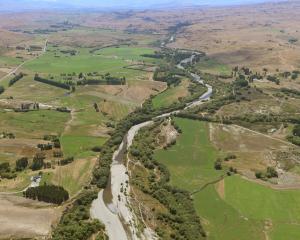Truck drivers say they are sick of being blamed for stock effluent deposited on roads and want the problem stopped at the farm gate.
They have talked about imposing a surcharge to clean effluent-drenched trailers and promise to get "more proactive" to beat the worst offenders.
Federated Farmers representatives are also concerned about claims effluent continues to cause problems, and are ready to help get it off Southern roads.
Land Transport Association Otago-Southland branch president John Scally on Monday said a "small number" of farmers were not "standing" their stock before they were loaded into trucks. "Standing" means taking them off grass and other greenfeed for at least six hours before they are transported, helping reduce effluent and the risk of spills on to roads.
Mr Scally said the Otago Regional Council was developing an enviable network of effluent dumps, but some farmers thought that meant they could load stock with bellies full of food.
"The most delinquent offenders ... are the ones that cause the biggest mess in our crates and on the roads," Mr Scally said.
"We have decided to get more proactive. We're not decided on the next steps, but the first is to let people know about the problem."
A new Road Transport Forum survey of 204 stock-transport operators from around New Zealand found 42% of stock had not been taken off greenfeed for at least six hours before transport, and a further 15% may not have been stood long enough.
Mr Scally said the results contrasted with those from a survey of farmers conducted by the Ministry of Agriculture and Forestry, which found stock transport operators were not emptying their effluent holding tanks before transport.
"But the feedback is that some farmers need to stand their stock before shifting the problem to operators. The operators do not own the effluent."
Federated Farmers Otago president Mike Lord was as sceptical of the forum survey as Mr Scally was of the Maf survey, but was concerned to learn some farmers continued to be blamed for effluent problems.
Industry groups and the regional council told farmers standing was better for animal welfare, and he was not aware of any reports suggesting effluent was causing more problems in the region.
"There is an element of co-operation in all this. A lot depends on the farmer getting adequate notice from the transport company so that standing can occur. So if there are issues, we'd like to know about them."
Federated Farmers North Otago president Ross Ewing sympathised with truck drivers who might have to accept green-fed stock or drive away unpaid.











